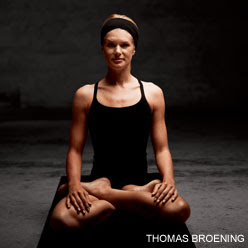Ujjayi Pranayama - Conqueror Breath

(oo-jy [rhymes with "pie"]-ee)
ujjayi = to conquer, to be victorious
Step by Step
1) Ujjayi is especially known for the soft hissing sound the breather makes by directing her inhales and exhales over the back of her throat. To learn how, try this.
2) Inhale through your nose, then exhale slowly through a wide-open mouth. Direct the out-going breath slowly across the back of your throat with a drawn-out HA sound. Repeat several times, then close your mouth. Now, as you both inhale and exhale through your nose, direct the breath again slowly across the back of your throat. Ideally, this will create, and you should hear, a soft hissing sound.
3) This sound, called ajapa mantra (pronounced ah-JOP-ah mahn-trah, the "unspoken mantra"), serves three purposes: it helps to slow the breath down (which is exactly what we want for Ujjayi), to focus awareness on the breath and prevent your min "wandering," and to regulate, by continually monitoring and adjusting the evenness of the sound, the smooth flow of breath (another important element of Ujjayi).
4) Start with 5 to 8 minutes of practice, gradually increase your time to 10 to 15 minutes. When finished return to normal breathing for a minute or two, then lie down in Shavasana (Corpse Pose) for a few minutes.
5) Ujjayi is the foundation of many other techniques listed on this site; e.g., ratio breathing, svara yoga, digital pranayama, retention along with the two bandhas. Note that Ajapa Mantra isn't used when performing digital pranayama.
Source : yogajournal.com

(oo-jy [rhymes with "pie"]-ee)
ujjayi = to conquer, to be victorious
Step by Step
1) Ujjayi is especially known for the soft hissing sound the breather makes by directing her inhales and exhales over the back of her throat. To learn how, try this.
2) Inhale through your nose, then exhale slowly through a wide-open mouth. Direct the out-going breath slowly across the back of your throat with a drawn-out HA sound. Repeat several times, then close your mouth. Now, as you both inhale and exhale through your nose, direct the breath again slowly across the back of your throat. Ideally, this will create, and you should hear, a soft hissing sound.
3) This sound, called ajapa mantra (pronounced ah-JOP-ah mahn-trah, the "unspoken mantra"), serves three purposes: it helps to slow the breath down (which is exactly what we want for Ujjayi), to focus awareness on the breath and prevent your min "wandering," and to regulate, by continually monitoring and adjusting the evenness of the sound, the smooth flow of breath (another important element of Ujjayi).
4) Start with 5 to 8 minutes of practice, gradually increase your time to 10 to 15 minutes. When finished return to normal breathing for a minute or two, then lie down in Shavasana (Corpse Pose) for a few minutes.
5) Ujjayi is the foundation of many other techniques listed on this site; e.g., ratio breathing, svara yoga, digital pranayama, retention along with the two bandhas. Note that Ajapa Mantra isn't used when performing digital pranayama.
Source : yogajournal.com

